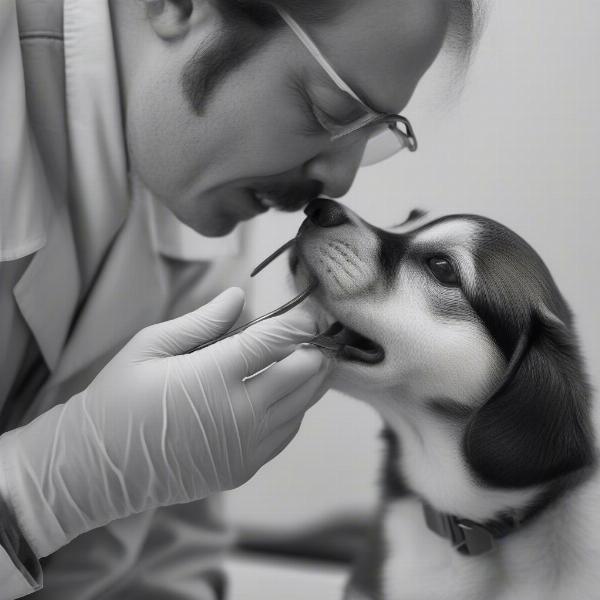Cleft palate dog surgery is a complex procedure aimed at correcting a birth defect where the roof of the mouth doesn’t fully close. This condition can significantly impact a puppy’s ability to eat and thrive. Understanding the surgery, recovery process, and long-term care is crucial for owners of affected dogs. This article will provide a comprehensive guide to cleft palate dog surgery, offering insights into the causes, diagnosis, surgical options, and post-operative care.
A cleft palate occurs when the tissues that form the roof of the mouth don’t join completely during fetal development. This leaves an opening between the oral and nasal cavities, causing various problems for affected puppies. They often struggle to nurse, leading to malnutrition and aspiration pneumonia. Surgical intervention is typically necessary to correct the defect and allow the puppy to lead a healthy life.
Understanding Cleft Palate in Dogs
What causes a cleft palate? While the exact cause isn’t always known, genetics, certain medications taken during pregnancy, and environmental factors are believed to play a role. Breeds like Bulldogs, Beagles, and Schnauzers have a slightly higher predisposition to this condition.
Diagnosing a cleft palate is usually straightforward. Veterinarians can often identify the defect through a visual examination of the puppy’s mouth. Sometimes, more advanced imaging techniques may be used to assess the extent of the cleft.
 Cleft Palate Dog Diagnosis
Cleft Palate Dog Diagnosis
Surgical Options and Procedures
The timing of cleft palate surgery varies depending on the severity of the condition and the puppy’s overall health. Ideally, surgery is performed between three and six months of age. However, in severe cases, intervention might be needed earlier.
There are different surgical techniques available, and the veterinarian will choose the most appropriate approach based on the individual case. The most common techniques involve creating flaps of tissue to close the opening in the palate. Bone grafts might also be necessary in some instances.
Post-Operative Care and Recovery
Post-operative care is essential for successful healing. Pain management is a priority, and the veterinarian will prescribe appropriate medications. A soft food diet is crucial to prevent irritation and damage to the surgical site. Preventing the puppy from licking or chewing the area is also vital. This can be achieved with an Elizabethan collar (e-cone).
What are the long-term outcomes? With successful surgery and proper care, most dogs with repaired cleft palates can live normal, healthy lives. However, some dogs may experience long-term complications, such as chronic nasal discharge or difficulty eating certain types of food.
Conclusion
Cleft palate dog surgery is a significant procedure that can dramatically improve the quality of life for affected dogs. By understanding the condition, surgical options, and post-operative care requirements, owners can provide the best possible support for their puppies. Early diagnosis and intervention are key to maximizing the chances of a successful outcome.
FAQ
-
What are the signs of a cleft palate in a puppy? Difficulty nursing, nasal discharge, sneezing, coughing, and slow growth.
-
How much does cleft palate surgery cost? The cost varies depending on the complexity of the case and the location of the veterinary clinic.
-
What is the recovery time for cleft palate surgery? Recovery typically takes several weeks, with close monitoring and adherence to post-operative instructions.
-
Can a dog with a cleft palate eat dry food? After surgery, a soft food diet is recommended, and some dogs may never be able to eat dry food comfortably.
-
What are the long-term complications of cleft palate surgery? Some dogs may experience chronic nasal discharge, difficulty eating certain foods, or recurrent infections.
-
Is cleft palate hereditary in dogs? Genetics can play a role in the development of a cleft palate.
-
When should I contact my vet after surgery? Contact your vet immediately if you notice any signs of infection, excessive swelling, bleeding, or difficulty breathing.
ILM Dog is your trusted source for expert advice on all aspects of dog care, from breed selection and puppy care to senior dog health and training. We provide comprehensive, practical information to help dog owners worldwide make informed decisions and provide the best possible care for their furry companions. For expert guidance on all your dog care needs, contact us at [email protected] or call us at +44 20-3965-8624. Visit ILM Dog for more valuable resources.